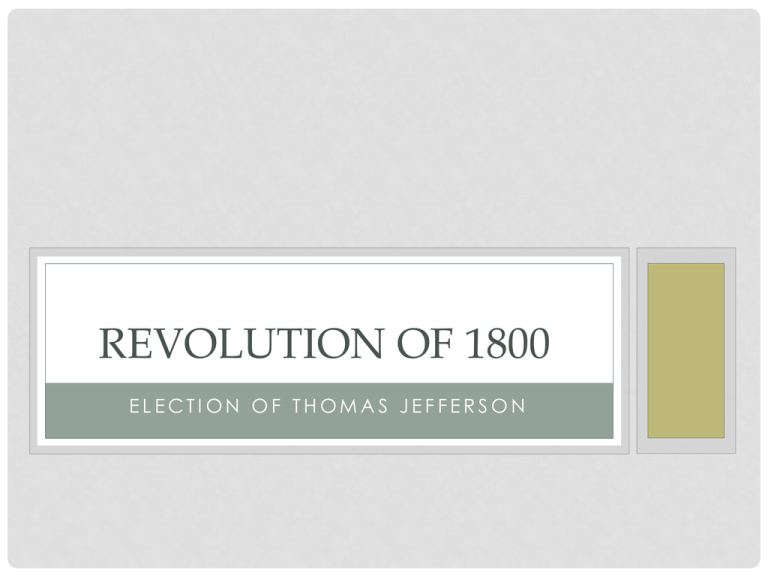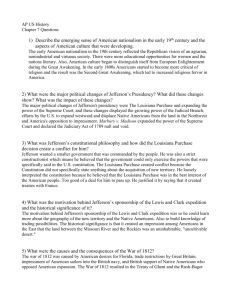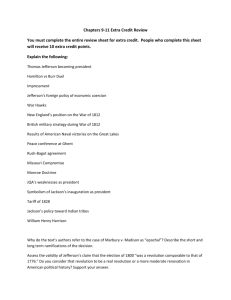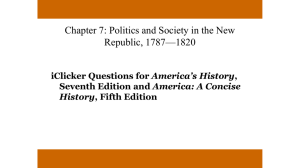Revolution of 1800
advertisement

REVOLUTION OF 1800 ELECTION OF THOMAS JEFFERSON ELECTION OF 1800 • Election was between Thomas Jefferson, Dem.Rep., ran against John Adams, Federalist • Extremely bitter election: Adams was seen by Dem.Reps. as wanting to create an American monarchy while Jefferson was viewed by the Federalists as dangerous due to his support of the French Revolution THE TWO PARTIES • Federalists: typically believed in a strong national government and commercial economy. Supported by bankers and businesses and was strong in the North • Dem.-Reps.: typically believed in a weak national government and an agricultural economy. Supported by farmers, artisans, and frontier settlers and was strong in the South RESULTS OF THE ELECTION… • Jefferson got eight more electoral votes than Adams • Aaron Burr, Jefferson’s running mate, received the same number of electoral votes as Jefferson meaning it was up to the House of Reps. to elect the president • After six days and thirty-five ballots, Alexander Hamilton convinced fellow Federalists to vote for Jefferson over Burr • Jefferson was seen as the better of two evils • First peaceful transfer of power between two political parties in U.S. history- known as the Revolution of 1800 AND 12TH AMENDMENT • Election revealed an issue on how the President and Vice-President were elected • Congress passed the 12th Amendment which allowed electors to vote for both Pres. and V.P. rather than casting two votes for Pres. • Fixed the problem of having a Pres. and V.P. from separate parties JEFFERSON AS PRESIDENT • Simplified the government and office of President: • Wore plain work clothes when receiving visitors • Cut back on spending for the army and navy • Eliminated taxes • Jefferson’s Presidency marked the beginning of a Southern dominance of politics which started with Jefferson being the first president to be inaugurated and work in Washington, D.C. U.S. EXPANSION • In 1800, Napoleon Bonaparte convinced Spain to return the Louisiana Territory to France • Had the idea of expanding his French Empire into North America • U.S. citizens, and Jefferson, were upset and worried when they learned that France might again have a strong presence again • Jefferson sent James Monroe and U.S. Ambassador to France Robert Livingston to purchase the Louisiana Territory from France • Napoleon agreed to sell due to the Haitian Revolution and renewed battles in Europe • Purchased doubled the size of the U.S. CONSTITUTIONAL QUESTION • Dem.-Reps. and Jefferson believed initially believed that the government did not have the authority under the Constitution to acquire new land and a new amendment was needed • Eventually though, Jefferson changed his mind and said that the government did have the authority to acquire new land • Made the change based on politics LOUISIANA PURCHASE EXPLORING THE NEW TERRITORY • Needed to explore the Louisiana Territory to establish a legal claim to it and to find out about its geography • All was done in secret; Jefferson had a bad relationship with the Federalists in Congress so the funding requests were kept a secret • Additionally Jefferson did not want to upset his party because there was no precedent for the expedition • Jefferson created an expedition to explore the new territory and appointed Meriwether Lewis to it • Called the Corps of Discovery from St. Louis to the Pacific Ocean LEWIS AND CLARK • Lewis picked William Clark as his second in command and selected 50 other soldiers and outdoorsmen for the expedition • Realized they need a guide for the expedition and eventually asked a fur trapper named Toussaint Charbonneau who brought his pregnant wife, Sacajawea • Sacajawea was extremely important to the expedition serving as an interpreter and guide • The expedition did not want to be seen as a war party by Native Americans; having a woman and child made it clear that their purpose was not war LEWIS, CLARK, AND SACAJAWEA Meriwether Lewis William Clark Sacajawea FOCUS OF THE EXPEDITION • Main purpose of the expedition to reach the Pacific Ocean and discover if it was possible to do so along a river for trade • Survey the new territory • Declare U.S. sovereignty over the territory to the Native American tribes living in the area • The secondary focus of the expedition was to collect samples and specimens to send back for study • Jefferson loved examining the specimens that Lewis and Clark sent back to him THE EXPEDITION • Departed on May 14, 1804 from near St. Charles, Missouri • Traveled along the Missouri River for the majority of the trip including through Kansas, Missouri, and Nebraska. The journey continued along other rivers including the Yellowstone, Salmon, Clearwater, and Columbia Rivers • Met with numerous tribes along the way, including meeting Sacagawea around winter in North Dakota PACIFIC OCEAN AND RETURN TRIP • The expedition succeeded in their goal of reaching the Pacific Ocean in mid-November of 1805 • Established a fort on the coast for shelter from storms but also to finalize the U.S. claim to the territory • Started the return home in March of 1806 • The expedition split up for part of the way so that Lewis could explore some side rivers • When the expedition reunited, Lewis was accidently shot in the leg when a hunter mistook him for an elk MAP OF THE EXPEDITION REACHING THE PACIFIC OCEAN LEGACY • The expedition succeeded in reaching the Pacific Ocean, in establishing diplomatic relations with the Native American tribes, and secured a legal claim to the land • Did not find a continuous water-way to the Pacific Ocean • Brought back numerous scientific samples and detailed drawings of the new territory POMPEYS PILLAR THE MARSHALL COURT • John Marshall was appointed Chief Justice by Adams; was a staunch Federalist • Marshall served on the Supreme Court for over 30 years and his decisions consistently strengthened the federal government at the cost of the state governments • Congress passed the Judiciary Act of 1801 which increased the number of federal judges by 16 • Adams then filled most of the positions at the last minute, called midnight appointments, in an attempt to influence future decisions JOHN MARSHALL MARBURY VS. MADISON • When Jefferson became President, he refused to deliver some of the appointments • William Marbury sued James Madison for the papers to be delivered which was ordered by the Judiciary Act of 1789 • Marshall found that the Supreme Court could not be forced to order the papers delivered under the act and found it unconstitutional • Established judicial review- ability of the Supreme Court to declare laws unconstitutional • Made the Judicial Branch equal in power with the other two FRIDAY, OCTOBER 31ST • Hand in homework • Take Daily Quiz • Lesson War of 1812 • Causes of the War • Opposition to the War • War of 1812 DAILY QUIZ • What Supreme Court case established judicial review? • What did the Louisiana Purchase do to the size of the United States? • Why is the election of 1800 known as the Revolution of 1800? • True/False: Dem.-Reps. believed in weak state governments and an agriculture based economy • What is your favorite candy? WAR OF 1812 THE ORIGINS OF THE WAR • Britain was engaged in a drawn out conflict with Napoleon and France • Part of the Napoleonic Wars which lasted from 1803-1815 • Neither side could let the other gain any sort of an advantage and needed to drain the other of resources CAUSES OF THE WAR • There were two main causes for the U.S. declaring war with Britain: • British restrictions on American trade and impressment of American sailors • British support for Tecumseh and the Indian Confederacy INTERFERENCE WITH TRADE • 1806-1807 both Britain and France passed laws restricting the ability of countries to trade with the other • Britain’s laws specifically targets neutral nations ability to trade • Americans felt that their international rights were being violated, particularly by the British • America responded with the Embargo Act of 1807 which banned trade with foreign ports • Hurt both New England and southern states BRITISH POLICY OF IMPRESSMENT • Britain also instituted a policy of impressment, American sailors who were born in Britain were captured and forced to serve in the British navy to man its ships which angered America even more • In Britain, you cannot renounce your citizenship and it viewed Britain's who became American citizens as still British; had to serve in the navy if caught • Impressed over 9,000 individuals into service • Britain learned that several individuals had join the U.S. Navy and were serving on the USS Chesapeake • When the ship was finally found of the coast of Virginia by the HMS Leopard which fired two broadsides to get the ship to submit, killing three American sailors • Caused a huge uproar in America TECUMSEH AND THE INDIAN CONFEDERACY • Tecumseh, a member of the Shawnee tribe, wanted to create a confederacy to resist the westward movement of Americans and the Treaty of Fort Wayne which sold Native American land to the U.S. • Britain saw the Native Americans as potential allies in the event of war • Kept the favor of Native American tribes by providing muskets and ammunition • Frontiersmen saw British support as interfering with the Westward expansion of the U.S. • During Tecumseh’s war, his brother attacked the forces of Harrison but ended up being defeated at the Battle of Tippecanoe which ended the war • Made Harrison a hero throughout the country WAR IS DECLARED • War was being called for by war hawks, congressmen from the South and West after learning the Britain had supplied weapons to Native Americans • Following the election of James Madison, the Dem.Reps. Had a stronger position to pursue a more aggressive agenda against Britain • War was declared in the spring of 1812 • The U.S. was unprepared for war and although it won battles against the British forces, those victories did not alter the course of the war OPPOSITION TO WAR • Federalists, who favored strong ties with Britain, opposed war • Embargo especially hurt New England economies which were based on trade and ships • Once war was declared, some Federalists dropped their opposition to the conflict but many remained opposed • Connecticut, Massachusetts, and Rhode Island refused to allow their militias to serve in the army against the British • Hartford Convention: In December 1814-January 1815 a series of meetings was held by Federalists to discuss how to fix their declining national influence HARTFORD CONVENTION PROPOSALS • Attention was focused on Constitutional amendments which would limit Southern and Dem.-Reps. influence while expanding their own • Removing the three-fifths compromise for determining representation • Requiring a two-thirds majority in Congress to declare war, admission of a new state, or interfering with trade • Limiting Presidents to one term • Requiring each President to be from a different state than their predecessor (targeted at Virginia) • Convention had very little success – the war ended before the convention could present its term to Congress • Seriously damaged the image of the Federalist Party WAR OF 1812 • War in Canada: • Quickly lost Detroit • Oliver Perry managed to defeat the British fleet on Lake Erie • War at Sea: • Badly outnumbered U.S. fleet scored minor victories against the British fleet but ended by being blockaded in ports by the end of the war • Part of the Chesapeake Campaign which saw the British fleet bomb Fort McHenry • On August 24, British forces entered Washington and burned the capitol and other buildings forcing the government to flee. Crushed moral of the country • Biggest victory came from Andrew Jackson and the Battle of New Orleans on January 8, 1815 in which Jackson stopped the British army from seizing New Orleans and using it to end the war • Unknown to Jackson, the war had ended with the Treaty of Ghent on Christmas Eve of 1814 END OF THE WAR • Treaty of Ghent: ended the war • Britain and America signed a commercial agreement in 1815 which reopened trade • The Rush-Bagot agreement in 1817 limited warships on the Great Lakes • Convention of 1818 set the boundary between U.S. and British Canada at 49th parallel • The U.S. also received a claim to the Oregon Territory and saw an increased number of Americans migrate down into Florida THURSDAY, NOVEMBER 6TH • • • • Take Daily Quiz Present Options speech from homework Turn in speech Lesson on Regional Economic Differences • What different economies began to emerge in the North and South? • Work on packet DAILY QUIZ • What were the two main causes of the War of 1812? • What is impressment? • What was the name given to a group of young Senators from the South and West who wanted war? • What hero emerged from the Battle of New Orleans? • What treaty ended the war? REGIONAL ECONOMIES THE INDUSTRIAL REVOLUTION • The Industrial Revolution was the change from hand tools and small-scale industries to machines and large-scale factory production • Eli Whitney was an inventor who pioneered the use of interchangeable parts in muskets; able to produce 5,000 muskets a year compare to 300 a year at other arms factories • Interchangeable parts are parts which are mass produced and could fit into any assembly regardless of where it was made • Invented the cotton gin which made it easier to separate seeds from the cotton fibers; made cotton extremely more profitable • Expansion of slavery into the deep south ECONOMY OF THE SOUTH • Eli Whitney’s cotton gin made it easier to clean short-fiber cotton • Short-fiber is easier to grow then long-fiber • Agriculture based economy; cotton was king • Cotton requires intensive manual labor requiring an expansion of slavery • Between 1790 and 1810 the number of slaves increased from 700,000 to 1,200,000 • Opposed high tariffs because it made imported goods more expensive • Could not manufacture goods COTTON GIN ECONOMY OF THE NORTH • Was rapidly industrialized due to the Industrial Revolution • Factory technology was brought from Britain to New England • Manufacturing based economy; mostly textile factories • Did not require physical labor so factories used female workers and children • Built railroads and canals to move goods • Erie Canal- linked the Atlantic Ocean to the Great Lakes • Part of the American System proposed by Henry Clay • Northern states favored high tariffs to protect manufactured goods from imports AMERICAN SYSTEM • The War of 1812 made it clear that America needed an independent economy from France and Britain • Designed by Henry Clay to unify the nation • Focused on transportation: roads, canals, eventually railroads, protective tariffs, and a new national bank • Raw materials would be shipped from the South to be manufactured in the North and then sold in the country • Made in America • National Road- first major federal highway which stretched from Maryland to Illinois • Started in 1811 and originally finished in 1818 • Became a gateway for people traveling West • Erie Canal TARIFF OF 1816 • In 1815 the government announced that if revenues were not raised the deficit would expand drastically by 1816 • A tariff on imported goods was suggested as the easiest way to raise revenue • Faced opposition by Southern states • John C. Calhoun of South Carolina rallied support by arguing the tariff would support national unity through independence of trade, agriculture, and manufacturing • Also that Britain had targeted American industries during the War of 1812 to cripple them SECOND BANK OF THE UNITED STATES • Many believed that a new bank would benefit the country • One of the cornerstones was that it would guarantee and make available a single currency making it easier to do business across the country • Given a charter in 1816 for a period of 20 years • Failed to have its charter renewed for a second time MONDAY, NOVEMBER 10TH • • • • Turn in review packet Take daily quiz Lesson on Nationalism Work on study guide DAILY QUIZ • What was the name of the system designed to unite our country and thought of by Henry Clay? • What was one of the most important functions of the new Bank of the U.S.? • What was the focus of the Southern economy? • What did the cotton gin do to slavery? • What was the focus of the Northern economy? NATIONALISM NATIONALISM • Nationalism: a devotion to the interests and culture of one’s nation MCCULLOCH VS. MARYLAND • Maryland opposed the creation of a second Bank of the United States • One of the local branches of the bank was located in Maryland so the state government decided to heavily tax that branch in hopes of making it fail • Issue: did Congress have the authority to create the bank and was the Maryland law taxing the bank unconstitutional? • Supreme Court ruled against Maryland • Congress could create the bank from the enumerated powers given to Congress in the Constitution • The tax was found unconstitutional because federal laws are supreme over states • “The power to tax is the power to destroy.” John Marshall GIBBONS VS. OGDEN • Gibbons vs. Ogden (1824) • New York granted charters granting the exclusive right to operate steamboats on rivers in New York – one operator was Aaron Ogden who operated the stretch between New York and New Jersey • Thomas Gibbons began operating a steamboat service along the same area arguing he was entitled to do so under federal law. Ogden sued Gibbons to stop him • Issue: did New York violate the Constitution by giving Ogden a monopoly on steamboats between New York and New Jersey? • The Supreme Court ruled in favor of Gibbons saying the interstate commerce could only be regulated by the federal government, not states NATIONALISM & FOREIGN POLICY • Rush-Bagot Treaty and Convention of 1818 • A growth of nationalism had prompted America to define its boundaries and prevent a strong military on the Great Lakes • The Rush-Bagot Treaty prevented the use of warships on the Great Lakes • Convention of 1818 defined the U.S.-Canadian border at the 49th parallel • Adams-Onis Treaty (1819) • A weakened Spain found itself unable to maintain control over its North American possessions and claims • Seceded Florida to the U.S. and gave up its claim to the Oregon Territory • Established a new boundary between the U.S. and Spanish possessions MAP FOLLOWING ADAMS-ONIS TREATY AN ASSERTIVE AMERICA • Following the defeat of Napoleon, European countries were able to focus on matters outside of Europe and wanted to reclaim their former colonies in the Western Hemisphere • Russia was starting to establish trading posts in what is now California and preventing non-Russian ships from approaching • President Monroe knew something had to be done to prevent European powers from carving up the Western Hemisphere and threatening America’s security MONROE DOCTRINE • In a message to Congress in 1823, Monroe warned countries not to interfere with affairs in the Western Hemisphere, including establishing new colonies or overthrowing independent governments, and that the U.S. would consider any intrusion “dangerous to our peace and security” • Became known as the Monroe Doctrine • U.S. was not strong enough to enforce the Monroe Doctrine • Britain was the main enforcer and backer of the doctrine • Started the “Special Relationship” between the U.S. and Britain • Britain saw newly independent states in Latin America as opportunities for new trade NATIONALISM PUSHES AMERICA WEST • Many American’s pushed West to find economic opportunities • Cheap, plentiful land • Trying to escape from debts in the East • There were also social gains to heading out west • Slaves who had escaped slavery found they could hide in the West and live with American Indians • Once a territories population reached 60,000, the people could petition Congress for entry into the Union as a state • In 1819, Missouri asked for entry, sparking a crisis MISSOURI ASKS TO BE A STATE • When Missouri asked to be admitted as a state, there were eleven free and eleven slave states • Threatened the balance between free and slave states in the Senate • Prevented one side from gaining the upper hand • When the Bill was brought up before the HoR, a provision was added which would gradually phase out slavery in Missouri THE MISSOURI COMPROMISE • Henry Clay proposed a series of agreements which collectively came to be known as the Missouri Compromise • 1. Missouri would be admitted as a slave state and Maine would be admitted as a free state, preserving the political balance between the two • 2. The rest of the Louisiana Territory would be divided along the 36°30’N north latitude line: south of the line would be slave states while north of the line, apart from Missouri, would be free states • “This momentous question, like a fireball in the night, awakened and filled me with terror. I considered it at once as the knell of the Union. It is hushed, indeed, for the moment, But this is a reprieve only, not a final sentence.” Thomas Jefferson MISSOURI COMPROMISE






